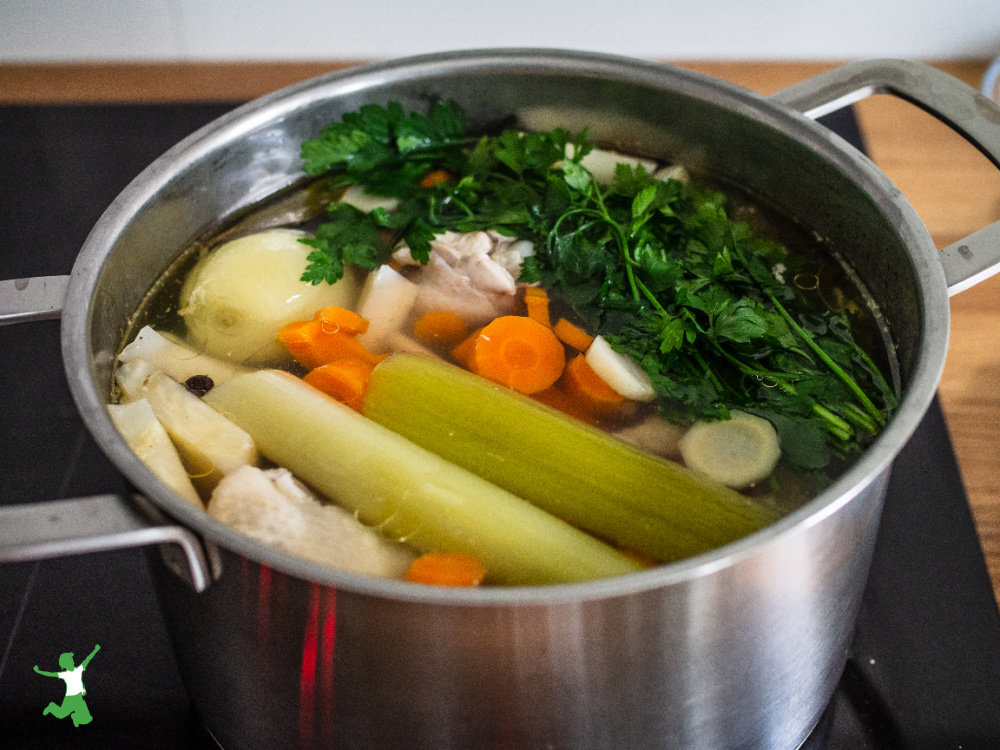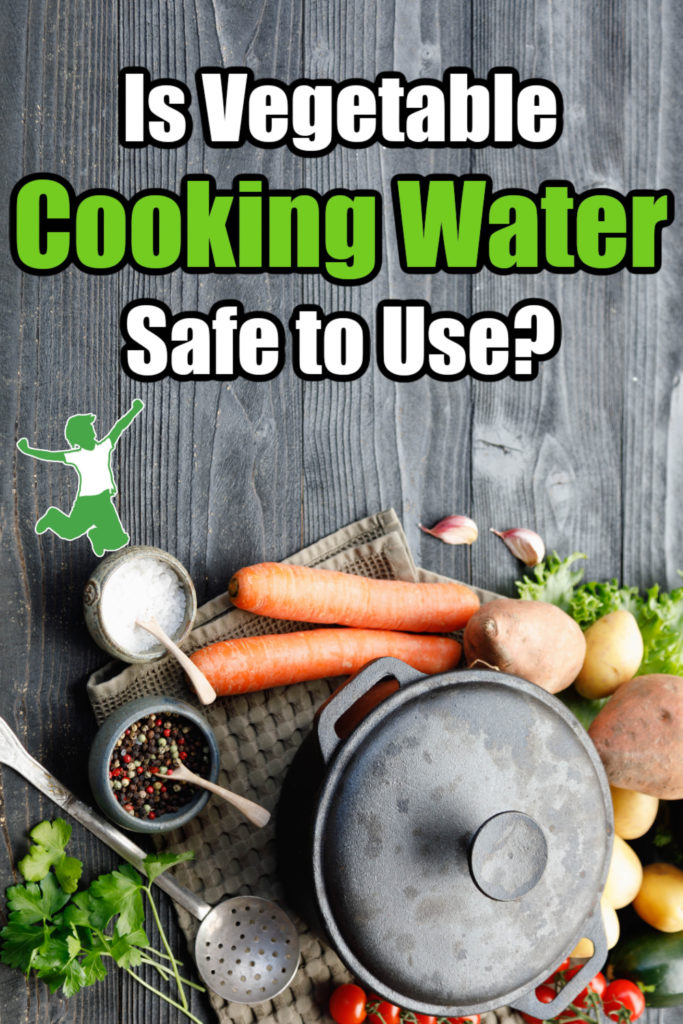Guidelines for when vegetable cooking water is safe to use and when it is best to toss due to nitrites, residues or anti-nutrients that can do more harm than good.

Adelle Davis popularized the practice of saving vegetable cooking water during the Leave it To Beaver era of the American 1950s.
She reasoned that any vitamins and minerals lost from cooking the vegetables would end up in the water.
This supposedly nutrient-rich cooking water could then be added to homemade soups or sauces with the nutrition benefiting those that consumed them.
This notion took hold and has not let go to this day.
Unfortunately, reserving vegetable cooking water can do more harm than good.
Consider the reasons below before you use it in your dishes. How to know your veggie cooking water is safe is discussed as well.
Chemical Residues
If the vegetables that are cooked are not organic, pesticides and nitrites from commercially produced fertilizers can end up in the cooking water.
Even low to no spray veggies such as asparagus would not be safe.
These crops are still typically fertilized with commercial preparations that are high in nitrites.
Anti-Nutrients
Cooking cruciferous vegetables such as broccoli, cauliflower, cabbage, Brussels sprouts, and kale would add goitrogenic (thyroid blocking) substances to the cooking water which should be discarded.
Water used to boil potatoes would contain chemicals called hemagglutinins that disrupt red blood cell formation.
Dark green, leafy vegetables such as beet greens, raw spinach, and chard contain oxalic acid that blocks calcium and iron absorption.
This irritating substance also can cause distress to the sensitive mucous membranes in the mouth and intestinal tract and contributes to the formation of kidney stones.
Consuming raw crucifers or dark, leafy greens is not an alternative either as the substances that cause problems when in the cooking water also cause problems if consumed directly with the vegetable in an uncooked state such as a raw green smoothie.
Legumes & Beans
For the last few years, the vegan community has popularized the trend of reusing legume cooking water, particularly from chickpeas.
This isn’t a safe practice even if the legumes or beans are soaked before cooking.
This soapy, slimy water is called aquafaba and is used as an egg replacement, particularly in dessert recipes. It whips up foamy just like egg whites.
Published research reveals that chickpea cooking water contains saponins, a potent anti-nutrient that contributes to leaky gut, which is at epidemic levels today.
It is also not advisable for pregnant women to consume this substance as it is a miscarriage risk.
Safe Vegetable Cooking Water
Do you really want to use vegetable cooking water as a frugal tool in your kitchen routine?
Consider this list of some of the most popular vegetables below. They are safe to use for that purpose.
- carrots
- turnips
- potatoes (peelings)
- parsnips
- beets
- celery
- organic pumpkins and squash (including zucchini)
- organic onions, leeks, and garlic
- nightshades (tomatoes, eggplant, and peppers among a few others)
For example, this potassium broth recipe uses vegetables simmered in water from the list above.
Simple Guidelines To Follow
Do you find it confusing to remember the distinctions between which organic veggies are safe to use and which are not?
Or, do you buy some veggies organic and others conventional?
If so, it is best to just adopt the practice of not using the cooking water at all.
This is particularly true if you tend to mix veggies together when cooking them.
Never Use Veggie Water for Baby Food
It is of particular importance NOT to use vegetable cooking water for use in pureeing homemade baby food.
Use pure filtered water instead, or if baby is old enough, some homemade bone broth or meat stock.
Final Caution to Consider
One final word of caution.
All vegetables tend to form nitrates after cooking and during storage. These nitrates can transform into strong carcinogens in the intestines.
Hence, it is best to avoid refrigerating and reheating vegetables, particularly leafy, green vegetables which concentrate nitrates when grown commercially.
References
Nourishing Traditions Cookbook









Hi,
That means the vegetable broth prepared by boiling various vegetables(non-organic) is also not good for health?
If you use veggies that don’t have anti-nutrients then this type of vegetable broth is fine. Examples if veggies fine for making vegetable broth include carrots, celery, cucumber, zucchini, all squashes.
Hi Sarah.. Is it good to cook spinach raw leaf and drink the water for nutrient?
No because the oxalic acid from the spinach is in the cooking water. This is an especially dangerous practice if you have candida issues or have kidney stones that run in the family.
I cooked up some beets and cauliflower, mushrooms, onions, garlic and stew meat, threw in some can tomatoes and nearly keeled over with bad gas, so bloated . . .how can I fit it?
Hi Sarah, I ended up on this page while searching silverbeet soup recipes.
I am very surprised to read your post, because I come from a culture in which practically all vegetables are cooked in small amounts of water, and the cooking water is considered to be the most nutritious part of the dish. (Supposedly because majority of the water soluable nutrients leak into the cooking water – I am not sure the extend of which this occurs.) I understand what you are saying about pesticides, but what do you think of the nutrients that are also discarded when the cooking water is thrown away? Isn’t the liver well equipped to neutralize most toxins in trace amounts?
I’m not always able to buy organic so does that mean the normal veggies which I put in a stew or casserole are unhealthy as all the pesticides and toxins come out when they’re cooking? In that case, why eat vegetables at all?
thanks Sarah, do you Jane any details on this please?
also… is it safe to use pasta cooking water? rice cooking/rinsing water?
Not a good idea to use cooking water from pasta or soaking water from any grains, beans or legumes.
Hi Sarah. Thank you for this detailed nsight. Would you be able to advise on the amounts of potentially harmful toxins and nitrites in the cooking water and whether these amounts are indeed harmful please? I am considering buying the reference book you have used (nutritious traditions) to find out but thought I would ask you first…?
Hi,
How did you leap from some vegetables leaking certain compounds into the water that have the POTENTIAL to contribute to (in extremely minimal ways) thyroid issues and gallstones and them not being ‘safe ??? this is what drives me round the bend with so-called heath blogs. Some times they do more harm than good. There is nothing unsafe about drinking vegetable water. If youre concerned about pesticides buy organic. As long as you eat in moderation and in balance you dont have to worry about your thyroid/gallstones/whatever when it comes to consuming vegetables.
Thank you for this info! 🙂 What about adding raw leafy greens to soup at the end of the cooking process? Or putting them in my thermos of hot soup to “stew” until lunch time later that day?